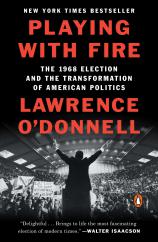Playing with Fire: The 1968 Election and the Transformation of American Politics
Review
Playing with Fire: The 1968 Election and the Transformation of American Politics
The year 1968 was an epic one in the history of American politics. It was scarred by the assassinations, barely two months apart, of a legendary civil rights leader and a presidential candidate, himself the brother of a murdered president. It finally laid bare the divisions in America over the conduct of a war that would not end before it cost more than 58,000 Americans their lives. And it was a year of intense, sustained political drama, in which an insurgent movement drove a president from office, culminating in the election of man who, according to most pundits, had written his own political obituary a mere six years earlier.
MSNBC host Lawrence O’Donnell’s PLAYING WITH FIRE is a masterpiece of popular political history. O’Donnell is fully equal to the task of compressing this blizzard of events into a fast-paced narrative he delivers with the graceful touch of a novelist. He’s also a savvy political observer who’s able to step back from pure reportage to offer perspective on the often chaotic developments that even now, to those old enough to recall them, still seem, in many ways, incomprehensible.
If there’s a hero in O’Donnell’s narrative, it’s Minnesota Senator Eugene McCarthy, who, in the space of only a few months, was transformed from an undistinguished lawmaker into the leader of a mass movement to end the Vietnam War. “The last word about Gene McCarthy should always be that no one did more to stop the killing in Vietnam than Senator Eugene McCarthy,” O’Donnell writes in concluding the book. Though he’s not in any sense antagonistic to Robert Kennedy --- who vacillated for months before challenging Lyndon Johnson for the Democratic nomination, and only entered the race after McCarthy exposed Johnson’s vulnerability with a near upset in the New Hampshire primary --- O’Donnell is unstinting in his praise of McCarthy’s courageous effort.
"...a masterpiece of popular political history. O’Donnell is fully equal to the task of compressing this blizzard of events into a fast-paced narrative he delivers with the graceful touch of a novelist."
O’Donnell meticulously documents the race for the nomination in both parties. For the Democrats, 1968 was the last year in which party bosses played an outsized role in choosing the nominee. Unlike today, 37 states had no presidential primaries, which put a premium on relationships with governors and senators who often played the role of “favorite sons” (no “daughters” in this era) to maintain control of their convention delegations. O’Donnell’s descriptions of the conventions’ backroom maneuvering, which involved last-minute efforts to draft Ronald Reagan on the Republican side and Edward Kennedy on the Democratic, may be a bit too detailed for all but hardcore political junkies, but his sharp eye for the telling detail and flair capturing the flow of these tumultuous events rescues them from tedium.
O’Donnell’s antipathy to Donald Trump is well-known, and he can’t resist searching for the seeds of Trumpism in this half-century-old campaign. The 1968 election marked the emergence of Roger Ailes, then age 27, as the mastermind of a television marketing campaign (chronicled in Joe McGinniss’ classic THE SELLING OF THE PRESIDENT) that turned Richard Nixon from “Tricky Dick” into a statesman Americans were willing to entrust with the task of ending the Vietnam War. Beyond its reliance on Ailes’ genius at using the media to manipulate public opinion, O’Donnell teases out some of the disturbing parallels between Trump’s “Make America Great Again” message and the dark appeal of Alabama’s racist Governor George Wallace. His description of a Wallace rally, for example, eerily foreshadows the roiling boil of Trump’s events:
“He drove them to fits of outrage, always trying to bring them to the brink of violence before holding them back. He made sure there was more than enough tension at his events that it always felt like anything might happen at any moment. And that always made news.”
O’Donnell’s account of the general election is slight in comparison to the rest of the book, comprising a mere 30 pages. That’s probably because the race lacked the drama of the nominating contests, as woefully underfinanced Vice President Hubert Humphrey, burdened with the albatross of Lyndon Johnson’s Vietnam policy, struggled to compete with the well-funded and highly efficient organization of the “New Nixon.” The Republican candidate did his best to remain vague on just about every important policy issue, with coded appeals to Wallace’s supporters, who later became Nixon’s “Silent Majority,” energized by his promise to restore “law and order” to American cities. As O’Donnell notes, Wallace’s presence as a third-party candidate created a plausible threat of an Electoral College deadlock, at least until his disastrous selection of retired General Curtis LeMay, whose infatuation with nuclear weapons sent the Wallace campaign into a tailspin.
O’Donnell does devote considerable attention to the claim that Nixon secretly induced the South Vietnamese government to back out of a deal to attend the Paris peace negotiations on the eve of the election and concludes that the Republican nominee worked deviously through backchannel contacts to torpedo that agreement. He makes a persuasive case for his conclusion that “what he did to win the presidency was his greatest crime.”
Combining outsized characters, triumph and profound tragedy, the 1968 election will be remembered as a defining moment in American politics. Lawrence O’Donnell has given us a story more than worthy of its complex, fascinating subject.
Reviewed by Harvey Freedenberg on December 1, 2017
Playing with Fire: The 1968 Election and the Transformation of American Politics
- Publication Date: November 6, 2018
- Genres: History, Nonfiction, Politics
- Paperback: 496 pages
- Publisher: Penguin Books
- ISBN-10: 0399563164
- ISBN-13: 9780399563164




